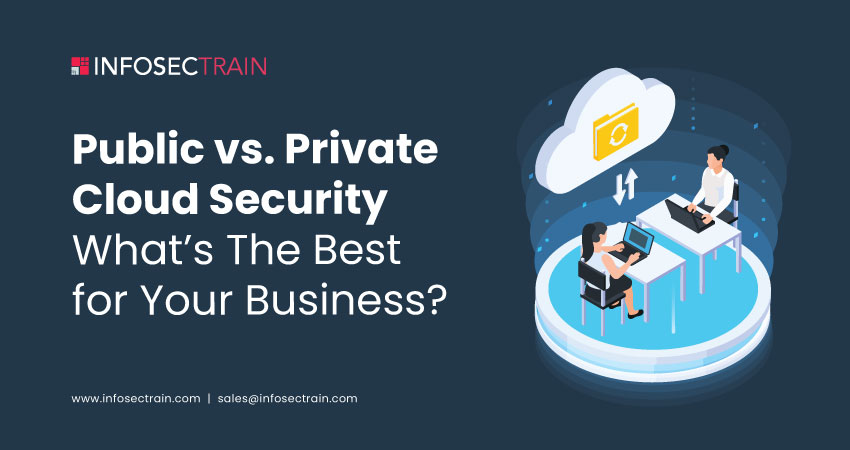Public vs. Private Cloud Security: What’s The Best for Your Business?
Public vs. private cloud security presents a critical decision point for businesses navigating the digital landscape. When considering the optimal security solution, weighing the merits of public and private cloud environments is paramount. Public cloud security offers scalability and cost-effectiveness but entails shared infrastructure risks. In contrast, private cloud security provides dedicated resources, which is ideal for organizations with stringent compliance requirements or sensitive data.

Table of Contents
What is Public Cloud Security?
Key Elements of Public Cloud Security
Benefits of Public Cloud Security
Challenges of Public Cloud Security
What is Private Cloud Security?
Key Elements of Private Cloud Security
Benefits of Private Cloud Security
Challenges of Private Cloud Security
Public vs. Private Cloud Security
Which Cloud is Best For Your Business?
What is Public Cloud Security?
Public cloud security involves cloud service providers (CSPs) implementing practices, technologies, and policies to protect data, applications, and infrastructure in their shared public cloud environments. These environments are accessible to multiple organizations over the internet, emphasizing the importance of implementing robust security measures, which is crucial for preventing unauthorized access and data breaches.
Key Elements of Public Cloud Security
- Data Encryption: Encrypting data both during transit and at rest is vital for safeguarding sensitive information against unauthorized access. Public cloud providers often offer data storage and transmission encryption services, ensuring heightened security measures.
- Identity and Access Management (IAM): Implementing robust IAM policies ensures that only authorized users and services can access resources within the cloud environment. This process involves employing techniques such as multi-factor authentication (MFA), role-based access control (RBAC), and adhering to the principle of least privilege.
- Network Security: Configuring firewalls, network segmentation, and virtual private networks (VPNs) helps control traffic flow and prevent unauthorized access to cloud resources. Additionally, intrusion detection and prevention systems (IDPS) actively monitor network traffic for suspicious activity, enhancing overall security measures.
- Compliance: Public cloud providers adhere to industry standards and regulations regarding data privacy and security, including HIPAA, PCI DSS, and GDPR. This entails implementing robust compliance measures to ensure regulatory requirements and best practices handle customer data.
Benefits of Public Cloud Security
- Cost-Effectiveness: Public cloud providers heavily invest in security infrastructure and expertise, enabling customers to leverage these resources without requiring significant upfront investment. This approach ensures cost-effectiveness for customers, who can access top-tier security measures without bearing the entire burden of upfront costs.
- Automated Security Features: Many providers incorporate automated security features that handle tasks such as patching vulnerabilities and detecting suspicious activity. This streamlines security management for users by automating crucial processes.
- Scalability: Public cloud security automatically scales with your requirements, removing the necessity for manual infrastructure provisioning and management. This simplifies the process of maintaining security measures as your needs evolve.
- Expertise: Public cloud providers maintain dedicated security teams that continually monitor and update their infrastructure, providing users access to advanced security expertise. This ensures users benefit from ongoing security enhancements and support from experienced professionals.
Challenges of Public Cloud Security
- Shared Responsibility: Customers must comprehend their security responsibilities and actively implement suitable controls within the cloud environment. This ensures that users actively contribute to securing their data and resources in the cloud.
- Compliance Concerns: Depending on the industry and regulations, public cloud storage may not suit susceptible data due to compliance concerns. This implies that users must carefully assess regulatory requirements and industry standards when storing sensitive information in the public cloud.
- Limited Control: Customers rely on the provider’s security measures and have less control over the underlying infrastructure than a private cloud. This means that users depend on the provider’s security protocols rather than having direct control over the infrastructure.
- Vendor Lock-In: Complex data portability challenges and integration complexities make switching to a different provider difficult, leading to vendor lock-in. This means that users may need help migrating their data and systems to another provider due to various technical hurdles and dependencies.
What is Private Cloud Security?
Private cloud security involves implementing practices, technologies, and policies to protect data, applications, and infrastructure within a dedicated environment exclusive to a single organization. Unlike public clouds, private clouds are not shared with other entities, ensuring higher control and customization over security measures to meet specific organizational needs and compliance requirements.
Key Elements of Private Cloud Security
- Access Control: Within the private cloud, ensure stringent access controls are in place to prevent unauthorized entry, utilizing authentication methods like passwords, multi-factor authentication, and role-based access control (RBAC) to uphold the principle of least privilege. Only authorized individuals can access resources by implementing these measures, lowering the risk of data breaches.
- Encryption: To ensure data security within the private cloud, utilize encryption techniques for data both in transit and at rest. Utilize Transport Layer Security (TLS) or Secure Sockets Layer (SSL) protocols to safeguard data while it is being transmitted. For data at rest, implement encryption algorithms like AES to maintain confidentiality and integrity, bolstering overall data protection measures.
- Logging and Monitoring: Activate logging and monitoring functions to oversee user actions, system events, and security issues in the private cloud. Employ real-time alerts and log analysis to identify and address security threats promptly.
- Compliance and Auditing: Ensure adherence to applicable data privacy and security regulations like GDPR, HIPAA, or PCI DSS in the private cloud. Regularly perform security audits and assessments to confirm compliance and pinpoint opportunities for enhancement.
Benefits of Private Cloud Security
- Enhanced Control: Organizations can exercise full control over security configurations in the private cloud, customizing them to meet unique needs and compliance mandates. This allows for precise alignment with organizational requirements and regulatory standards.
- Compliance: Meeting industry regulations and compliance needs are simplified by increasing control over the environment in the private cloud. This facilitates tailored adjustments to ensure alignment with specific regulatory standards and industry requirements.
- Improved Security: Dedicated infrastructure lowers the likelihood of unauthorized access and data breaches compared to public clouds, enhancing overall security posture.
- Customization: Organizations can tailor security controls and implement solutions that align precisely with their environment, enhancing security effectiveness. This flexibility allows for optimal adaptation to unique requirements and threat landscapes.
Challenges of Private Cloud Security
- Increased Expenses: Managing and maintaining secure infrastructure demands substantial hardware, software, and personnel investments, resulting in higher costs. This financial commitment is necessary to ensure the ongoing security and integrity of the infrastructure.
- Management Burden: Smaller organizations may find it challenging to manage and maintain infrastructure securely due to the specialized expertise required. This requires dedicated personnel to handle the management burden effectively and uphold robust security practices.
- Less Scalability: Scaling resources in the private cloud may entail slower and more intricate processes than in the public cloud, necessitating extra planning and investment. This complexity can impede rapid scalability and requires careful consideration for smooth resource allocation.
- Lack of Expertise and Skills: The absence of necessary knowledge and varying skill levels among team members can hinder efficient operations and pose challenges in managing the infrastructure effectively. This underscores the significance of continuous training and knowledge sharing to address skill disparities and uphold operational excellence.
Public vs. Private Cloud Security
| Basis | Public Cloud Security | Private Cloud Security |
| Infrastructure | Shared with other organizations | Dedicated to a single organization |
| Security Features | Built-in security features provided by CSP | Requires implementing and managing own security controls |
| Control | Limited control over underlying infrastructure | Full control over infrastructure and configuration |
| Scalability | Highly scalable | Less scalable |
| Cost | lower cost | Higher cost |
Which Cloud is Best For Your Business?
When selecting the right cloud security approach, assess your business’s unique needs, risk tolerance, and compliance mandates. Public Cloud offers cost-effective scalability and agility, robust security measures, and shared environment risks. The private cloud caters to stringent security and compliance demands, providing greater control and customization. Opting for a hybrid cloud strategy combines both advantages, ensuring cost-effectiveness and scalability while maintaining heightened security for sensitive data. Ultimately, the choice hinges on your specific requirements, emphasizing the importance of a tailored approach to cloud security.
Cloud Computing with Infosectrain
InfosecTrain offers valuable insights into understanding the significance of recognizing the potential advantages of your cloud investment. When assessing storage servers or similar advancements, emphasis should be placed on their effects on end users. Companies utilizing cloud-based data networks need assurance of seamless operations despite server failures, security breaches, or human errors. For a more comprehensive grasp of Cloud Computing, delve into the resources provided by InfosecTrain. Their expertise can equip you with the understanding necessary to enhance your cloud infrastructure and manage risks efficiently.



 1800-843-7890 (India)
1800-843-7890 (India) 
